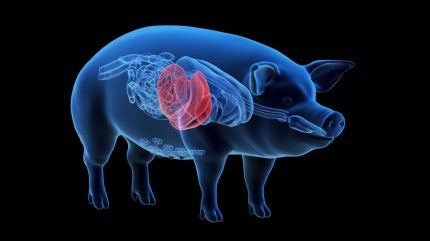
eGenesis has gained US Food and Drug Administration (FDA) clearance on an investigational new drug (IND) application for a genetically engineered porcine (pig) liver.
The organ is designed for use with OrganOx’s extracorporeal liver cross-circulation (ELC) system for patients with acute-on-chronic liver failure (ACLF).

Discover B2B Marketing That Performs
Combine business intelligence and editorial excellence to reach engaged professionals across 36 leading media platforms.
The biotech and medtech companies entered an exclusive clinical co-development agreement last year to advance their respective technologies in combination.
Research indicates that around 35,000 patients in the US are hospitalised for ACLF each year. Meanwhile, most individuals wait between three and five years for a kidney, as per the American Kidney Fund. eGenesis’ pig liver is intended to draw down on the mortality rates in patients awaiting a transplant.
The Phase I trial plans to enrol 20 patients with ACLF (Grade 2 to Grade 3) and hepatic encephalopathy (≤ Grade 3), who are ineligible for transplant, across multiple US centres.
eGenesis’ EGEN-5784 pig liver in combination with OrganOx’s ELC is intended to support the function of patients’ decompensated liver, potentially allowing for the recovery of a patient’s native liver or providing sufficient time to receive a liver transplant.

US Tariffs are shifting - will you react or anticipate?
Don’t let policy changes catch you off guard. Stay proactive with real-time data and expert analysis.
By GlobalDataeGenesis CEO Michael Curtis commented: “The FDA’s clearance of EGEN-5784 in combination with the OrganOx ELC system represents a significant advance towards fulfilling our mission to develop safe and effective human-compatible organs that have the potential to transform the treatment of organ failure and extend patients’ lives.
Last year, OrganOx and eGenesis completed their first extracorporeal perfusion of a research donor using their combined offerings. The process involved circulating a recently deceased donor’s blood through the genetically engineered EGEN-5784 pig liver outside of their body, with the donor being the first to be enrolled in the companies’ ongoing PERFUSE-2 study.
In the first procedure, stable blood flow, pressure, and pH were maintained throughout the procedure, with no evidence of rejection observed, with the perfusion electively stopped, per-protocol, at 72 hours, with the liver appearing healthy.
Last year, eGenesis became the first company to successfully implant a pig kidney into a living patient at Massachusetts General Hospital (MGH) under the FDA’s expanded access programme and concluded a $191m Series D financing round to continue the development of EGEN-5784.
While Rick Slayman, the end-stage kidney disease patient who received the implant, died two months later, MGH stated there was no indication that the death was a result of the transplant.





